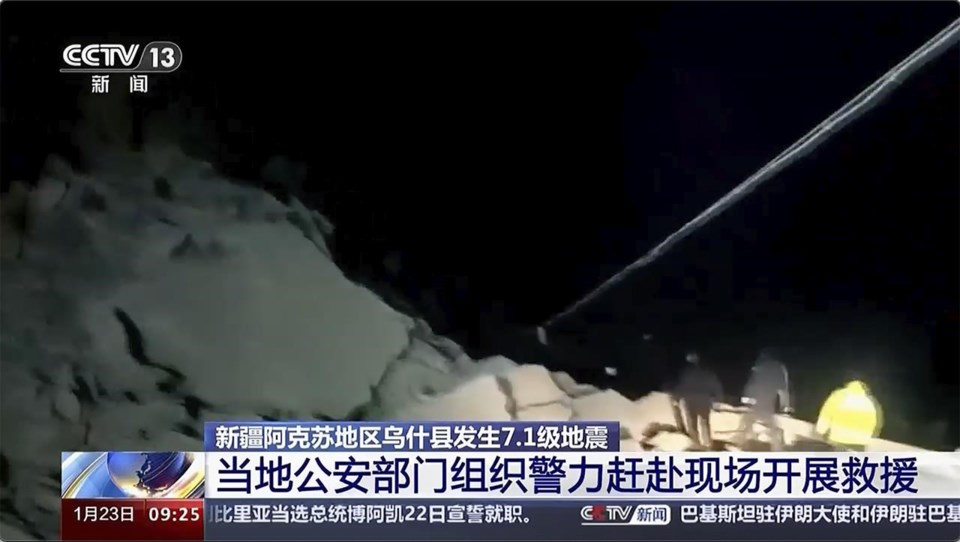BEIJING (AP) — A magnitude 7.1 earthquake struck a sparsely populated part of China’s western Xinjiang region early Tuesday, injuring six people and damaging or collapsing more than 120 homes in freezing cold weather, authorities said. The quake was the latest in a series of seismic events and natural disasters to hit the vast country's western regions.
The quake rocked Uchturpan county in Aksu prefecture shortly after 2 a.m., the China Earthquake Networks Center said. Around 200 rescuers were dispatched to the epicenter. The county is called Wushi in the Mandarin language spoken by most Chinese.
Of the six people hurt, two had serious injuries and four were minor. In addition, 47 houses collapsed, 78 houses were damaged and some agricultural structures collapsed, the government of the Xinjiang Uygur Autonomous Region posted on its official Weibo social media account.
The quake downed power lines but electricity was quickly restored, Aksu authorities reported. Mountainous Uchturpan county had around 233,000 people in 2022, according to Xinjiang authorities.
Urumqi Railroad Bureau resumed services after 7 a.m. following safety checks that confirmed no problems on the train lines. The suspension had affected 23 trains, the bureau serving the Xinjiang capital said on its official Weibo account.
The U.S. Geological Survey said the quake measured 7.0 magnitude and occurred in the seismically active Tian Shan mountain range. It said the area's largest quake in the past century was 7.1 magnitude and occurred in 1978 about 200 kilometers (124 miles) to the north of one early Tuesday.
Multiple aftershocks were recorded, the strongest of them at 5.3 magnitude.
The rural area is populated mostly by Uyghurs, a Turkic ethnicity that is predominantly Muslim and has been the target of a state campaign of forced assimilation and mass detention. The region is heavily militarized and state broadcaster CCTV showed paramilitary troops moving in before dawn to clear rubble and set up tents for those displaced.
Uchturpan county is recording temperatures well below freezing, with lows down to negative 18 degrees C (just below zero F) forecast by the China Meteorological Administration this week.
In Yunnan province in China's southwest, rescue workers were still searching for victims buried by a landslide Monday in the village of Liangshui. Eleven bodies have been recovered, and two survivors were rescued from among the 47 people buried in 18 homes in freezing cold and falling snow.
The tremors from Tuesday's earthquake were felt hundreds of kilometers (miles) away. Ma Shengyi, a 30-year-old pet shop owner living in Tacheng, 600 kilometers (373 miles) from the epicenter, said her dogs started barking before she felt her apartment building shudder. The quake was so strong her neighbors ran downstairs. Ma rushed to her bathroom and started to cry.
“There’s no point in running away if it’s a big earthquake," Ma said. “I was scared to death."
Chandeliers swung, buildings were evacuated and a media office building near the epicenter shook for a full minute, the official Xinhua News Agency reported. A video posted by a Chinese internet user on Weibo showed residents standing outside on the streets bundled in winter jackets, and a photo posted by CCTV showed a cracked wall with chunks fallen off.
Tremors were felt across the Xinjiang region and in the neighboring countries Kyrgyzstan and Kazakhstan. In the Kazakh capital of Almaty, people left their homes, the Russian news agency Tass reported. In both Xinjiang and Kazakhstan, classes were suspended to allow children to recover from the shock.
Videos posted on the Telegram messaging platform showed people in Almaty running down the stairs of apartment blocks and standing outside in the street after they felt strong tremors. Some people appeared to have left their homes quickly and were pictured standing outside in freezing temperatures in shorts.
Earthquakes are common in western China, including in Gansu, Qinghai, Sichuan and Yunnan provinces, as well as the Xinjiang region and Tibet.
A 6.2 magnitude earthquake that struck Gansu in December killed 151 people and was China's deadliest quake in nine years. An earthquake that hit Sichuan in 2008 killed nearly 90,000 people. The collapse of schools and other buildings led to a yearslong effort to rebuild using more quake-resistant materials.
___
Follow AP's Asia-Pacific coverage at https://apnews.com/hub/asia-pacific
The Associated Press



